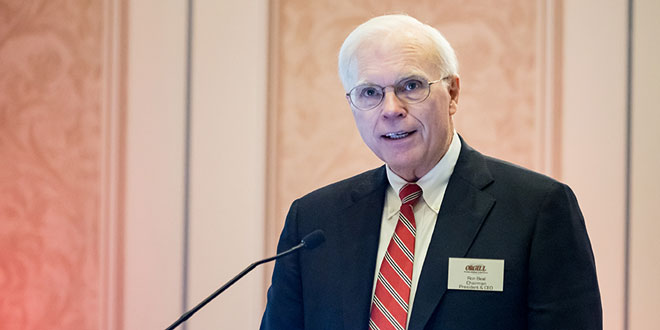Ron Beal
Chairman and CEO
Beal joined Orgill in 1985 and served as a senior vice president and general manager before becoming president and CEO in 2005, and chairman in 2013. In 2019, he stepped down as president, but remains the chairman and CEO.
Hardware Retailing (HR): What in your strategy has allowed for the kind of growth Orgill has experienced recently?
Ron Beal (RB): Our strategy is pretty simple: Take care of our customers every day and execute at consistently high levels at everything we do. It can be easy to overcomplicate things. We continually remind ourselves that the easier we make it for our customers to do business with us, the more time they have to concentrate on their own operations.
We also strive to provide our customers with choices. We focus on offering our customers options, not rules, because we have a very high regard for their ability to select and make the decisions that are right for their businesses.
Given the right support and tools, it is our experience that most independent retailers will do what is required to be successful. That entrepreneurial mindset is a major reason why there are still so many successful independent retailers throughout our industry.
HR: Do you see anything about your strategy or approach to the market changing?
RB: Change is a fact of life. We want to be proactive versus reactive to the needs of our customers, whatever that requires. We want to be disciplined in our approach and deliver continuous, incremental improvement in everything we do. The industry is always evolving, but rarely at a rate that requires dramatic, short-term, disruptive change.
That being said, I don’t think there is another distribution company in this industry that embraces new technology more than we do. When you look at the advancements we have made with our delivery fleet, our distribution centers, our e-commerce programs and the systems inside our organization, you’ll quickly see how consistent we’ve been in making the investments and improvements that make sense for our company and our customers.
HR: Has this type of approach always been the case for Orgill?
RB: Being proactive and methodical seem to be in our corporate DNA. We embrace the idea that we want to be evolutionary rather than revolutionary, and that holds true with basically everything we do. It’s certainly true when you look at the fact that our company has been around for 172 years. During that time, change has always been a constant. We welcome change and plan for it, and are rarely caught by surprise. We don’t have a history of having to operate in crisis mode.
HR: Orgill has seen some changes in its leadership structure in the past several years, and it will continue to change moving forward. Would you consider these changes evolutionary?
RB: Without a doubt. Certainly our leadership team continues to evolve. Joe Orgill (who passed away last spring) was a strong presence in the industry and within the company. Many years ago, he and his business partner, Mike McDonnell, laid the foundation for an orderly and successful transition from a family-run to a company overseen by an experienced executive team. We see that same kind of planning and implementation going on now.
The executive team that works directly with me all has expanded responsibilities in 2019, with Boyden Moore, as president; Brett Hammers as executive vice president of sales and supply chain, and Eric Divelbiss as executive vice president of finance and administration. Each brings many years of unique experience to these new roles, both at Orgill, and within the overall industry. The key thing is that this group, along with our other senior staff, has for many years functioned well together as a team. These changes have been planned for a long time and will make us even more effective.
People tend to focus a lot on the top echelon of management, and certainly, orderly transitions at the top are critical, but it is also vital that transition planning extends to all levels of management. We make sure this happens. People who come to work for Orgill tend to stay here. We have a real mix throughout the company of veteran employees who provide stability and hands-on experience, along with newer members of the team who bring new ideas and energy. That’s by design, and helps ensure consistent and orderly evolution within the company.
HR: You’ve talked about incremental improvements. Can you expand on this concept and how Orgill focuses on continuous improvement?
RB: There are a lot of things we focus on, but definitely one of the things that is a core objective for us as a distribution company, something we know we have to do, is to always find ways to get products to our customers more efficiently and less expensively. This is one area where incremental improvement is incredibly important.
Every single day, we have to focus on how can we buy better, deliver product more efficiently and help retailers grow their margins. The cumulative impact of this continued, incremental improvement in the way we operate over a period of three years, five years, 10 years can be profound—not just for Orgill, but more importantly, for our customers.
HR: How do you challenge your team to keep improving?
RB: One way we do this is by providing our employees with the support they need, along with the incentives required to keep pushing to be better. That includes extensive, ongoing training at all levels.
For example, we have a full-time training department that focuses on providing our field sales representatives with the knowledge and support to enable them to better serve our customers. Along with this ongoing commitment to training, we also work hard to push the decision-making as close to the ground as possible within our team. We want to empower the people who are closest to any situations we may face to make the decisions that will positively impact our customers.
You can see this in action when you look at some of our responses to the recent hurricanes that devastated large parts of the Southeast. Our sales and service staff in the field and the employees at our distribution centers worked very effectively together in making decisions about what needed to be done. They weren’t waiting for permission to act to funnel down from corporate. We are very proud of how quickly they were able to react to these challenges.
HR: There has been a lot of discussion within the industry about the best distribution model for today’s environment. What is your take on this?
RB: I’ve always felt the whole co-op versus independent argument is a bit of a red herring. The reality is that the corporate structure of a company doesn’t ensure success or failure. What really matters is how good of a supplier the company is to its customers.
The ability to service customers doesn’t depend a great deal on the corporate structure. There are very successful distributors that have been co-ops and non co-ops, and there are unsuccessful distributors that fall into both categories. Whether a company is a co-op or non co-op isn’t a very reliable predictor of success.
HR: Orgill has never promoted a national brand for its customers. Do you think that presents a challenge?
RB: Some people may misconstrue the fact that we don’t have a national brand as meaning that we don’t think brand is important for a retailer. Nothing could be further from the truth.
A store’s brand is exceedingly important to its customers. That individual brand is based on the performance, consistency and experience that a particular retailer or company creates for its customers, and controlling that brand is critical for the retailer. Where we differ from some suppliers on brand is that we don’t feel a national brand is necessarily a positive factor in supporting a retailer’s operation within their specific market. In fact, we feel a national brand can many times be a negative.
In our industry, it is very hard to ensure that the expectations of a customer who has been in one store flying a particular flag and then goes into another store with the same sign in a different market are satisfied. It is difficult to try to manage a national brand if you are not able to exert high levels of control over the in-store experience in every location, in every market. Our way of doing business is to help retailers focus on controlling and promoting their brand in their trading area. Experience has shown this approach to be extremely effective for thousands of hardlines retailers. Independents will always have to zealously do the things necessary to create a unique and positive brand image in their individual markets. It’s our job to give them the support and tools necessary to help them do this.
 Hardware Retailing The Industry's Source for Insights and Information
Hardware Retailing The Industry's Source for Insights and Information








